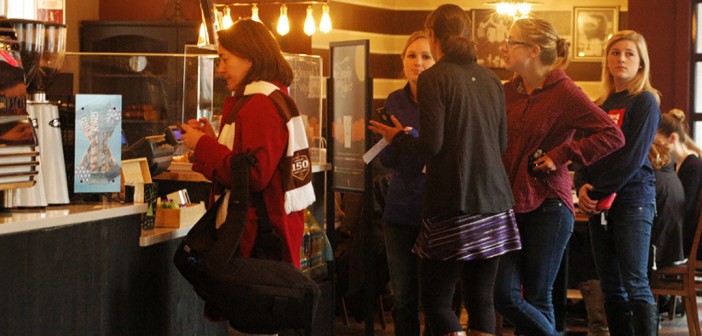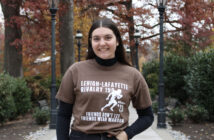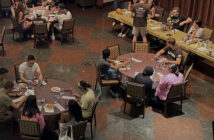Lehigh’s favorite beverage may not be exactly what you think it is.
Business Insider recently ranked Lehigh as the third most-caffeinated college campus in the country, according to order-placement statistics from online food delivery service GrubHub.
“Funny story…last week, I couldn’t figure out why I was so tired,” said Kathryn Ortolf, ’16. “I realized that, for 10 days, I’d been drinking decaf because my Keurig cups were accidentally decaffeinated. I love coffee because my life literally depends on it.”
In addition to brewing their own coffee, however, many students opt to purchase caffeinated beverages at a variety of on-campus locations, such as Lucy’s Café, Common Grounds in Rauch Business Center, and the bookstore’s Starbucks branch. Students also visit off-campus locations, such as Saxbys Coffee on West Morton Street or Déjà Brew at the corner of West Fourth and Vine Streets.
In short, the Lehigh community embodies the Harvard School of Public Health’s declaration that tea and coffee are the two most commonly consumed beverages on the planet, behind only water.
Chances are, however, your caffeine buzz requires a hefty down payment.
Lucy’s Café, for instance, charges $3.80 for a Grande caffé late, $4.25 for a white chocolate mocha and $4.29 for each of its frozen blended beverages. Thus, students who purchase just one beverage from the café each day likely face monthly coffee expenses of over $100.
In the second quarter of the 2014 fiscal year, furthermore, Starbucks’s global revenue totaled $3.87 billion. According to Bloomberg’s Leslie Patton, the company takes the top spot among the largest global coffee chains by a landslide. The claim isn’t hard to believe. According to the chain’s store locator, there are roughly 30 Starbucks locations (including in-store outlets) within a 30-mile radius of Bethlehem alone. Company review site GlassDoor reports that the average Starbucks barista is paid $9 per hour. Taxes and other expenses aside, Starbucks could therefore pay roughly 430 million baristas for one hour of work each using just its 2014 second-quarter revenue.
Our culture certainly fosters the practice of sacrificing a pretty penny for our caffeine. But are we paying an even greater price in the long run?
Consumed plain, coffee and tea are calorie-free beverages packed with antioxidants, flavonoids, and other biologically active substances that may be good for health, the Harvard School of Public Health reports. Up to three or four cups of coffee or tea a day appear to be fine for a person’s health, the school reports. Green tea, in particular, has garnered attention for its potential role in protecting against heart disease, while coffee may help protect against type 2 diabetes.
According to the Mayo Clinic, furthermore, the health benefits of coffee tend to outweigh its risks. “Recent studies have generally found no connection between coffee and an increased risk of cancer or heart disease,” the Mayo Clinic’s Donald Hensrud, M.D., said. “In fact, most studies find an association between coffee consumption and decreased overall mortality, (as well as) possibly cardiovascular mortality.”
As the clinic reports, studies have shown that coffee may also protect against Parkinson’s disease and liver disease, including liver cancer, and may improve cognitive functions and decrease the risk of depression.
Despite its monetary cost, if coffee boosts our energy levels, protects our health and may decrease the risk of mental illness, there seems little incentive not to drink it.
As it turns out, however, much of the data surrounding caffeine consumption is gathered from a variety of black coffees or drinks that have a small amount of milk or sugar. Such beverages stand in sharp contrast to the highly popularized Grande, quad, non-fat, one-pump, no-whip mochas of Starbucks lore.
The company’s nutrition site reports that one Grande Double Chocolaty Chip Crème Frappuccino ® Blended Crème clocks in at 500 calories — or 25 percent of the standard recommended daily calorie intake. And the dark-green-and-white Starbucks siren isn’t the only bane of many nutritionists’ existence; a large Frozen Caramel Coffee Coolatta ® with cream from Dunkin’ Donuts, for instance, has 990 calories and 130 grams of sugar.
Typical sugar packets contain about 3 grams of sugar, so one of the aforementioned Coolattas contains the rough equivalent of 43 packets of Splenda. Care for some coffee with your sugar?
College students are notorious for their excessive caffeine consumption, which is often fueled by the desire to perform well in classes. Lehigh itself provides no exception.
Baker’s Junction alone sells anywhere from 300 to 500 beverages each day, according to Director of Dining Services Jason Lenig. 60 percent of those sales generally take place in the morning.
“We’re always busiest in the morning,” said Baker’s Junction Sodexo employee Rebecca Yenca. The café is open from 7:30 a.m. to 8 p.m. on weekdays and is closed on weekends. “It gets really busy around 9 a.m. It also gets much busier during exam periods and when it’s cold out.”
Among the café’s most popular items are its caramel macchiato and seasonal beverages, such as pumpkin and peppermint lattes, as well as holiday blend coffee.
In an NPR interview, Bruce Goldberger, a toxicologist at the University of Florida, said the half-life of caffeine in the body can range from 2.5 hours to 12 hours. He said the average half-life, however, is about five hours, which means caffeine typically remains in the body for about 10 hours.
“If someone has a cup of coffee at 7 p.m., the caffeine that they’ve ingested is still in the body affecting the central nervous system when they’re going to bed,” Goldberger said. In the same NPR report, the College of the Holy Cross’s Amy Wolfson suggests that if college students are getting too little sleep, or sleep of a lesser quality, it’s likely to have negative implications for their academic performance.
Still, it’s highly unlikely that the Lehigh community will stage a revolt against caffeine of all types. So what’s the trick to monitoring our caffeine consumption?
NPR’s Allison Aubrey suggests sticking to, at most, just a few low-sugar, low-cream and low-flavoring caffeinated beverages each day. “As a rule of thumb, if you want to go to sleep by midnight — and stay asleep — it’s probably best not to drink coffee after 2 p.m.,” she said.






Comment policy
Comments posted to The Brown and White website are reviewed by a moderator before being approved. Incendiary speech or harassing language, including comments targeted at individuals, may be deemed unacceptable and not published. Spam and other soliciting will also be declined.
The Brown and White also reserves the right to not publish entirely anonymous comments.